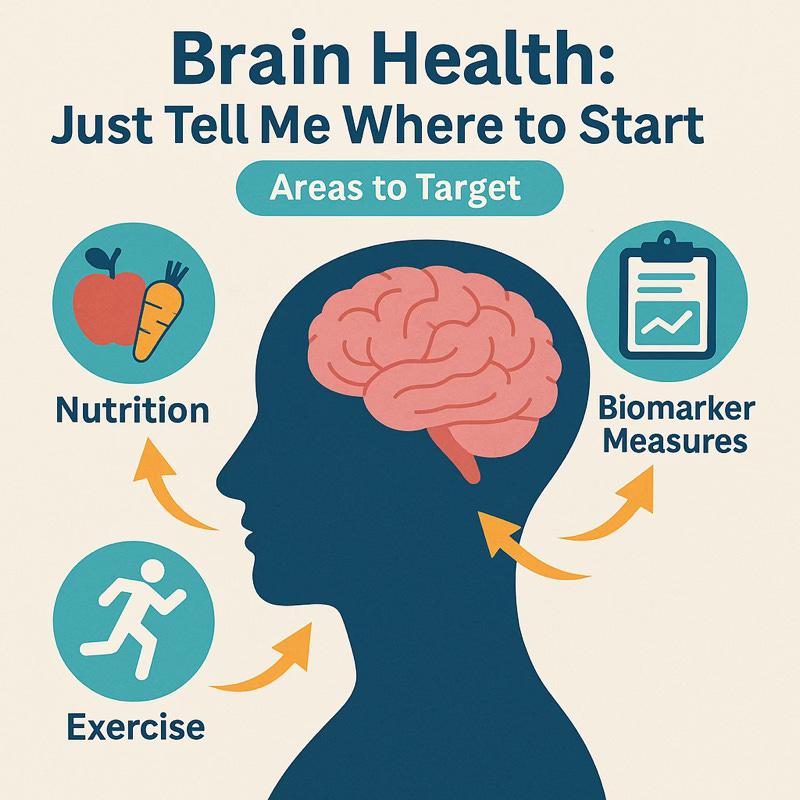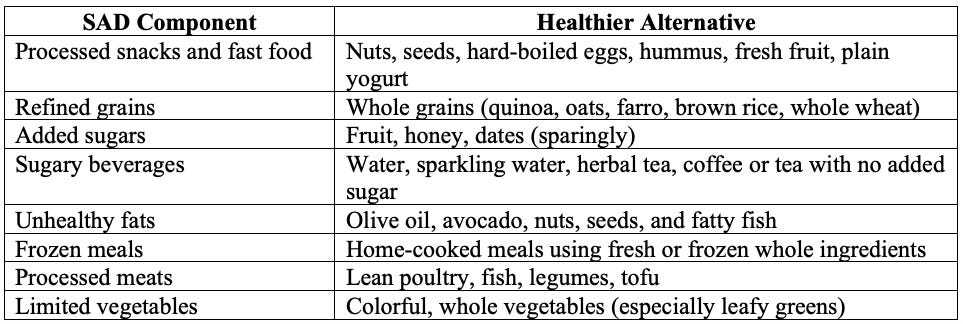Several friends have recently asked me a simple but important question:
“What are the top few areas I should focus on to keep my brain healthy?”
Many of us get lost in the weeds of brain health advice—high-intensity cardio, supplements, hyperbaric oxygen therapy, hormone optimization, keto or MIND diets, sleep hygiene, meditation, hearing tests, and so much more. But most people just want the bottom line—a CliffsNotes version they can act on.
Of course, the right steps will differ based on individual circumstances. A 75-year-old with obesity and a sedentary lifestyle will have different priorities than a metabolically healthy, active 50-year-old.
That said, there are three foundational areas that most people can benefit from focusing on to reduce their risk of dementia (and improve overall health, too):
1. Nutrition: Move away from processed foods, added sugars, and unhealthy fats. Increase your intake of fruits, vegetables, whole grains, and healthy fats.
2. Exercise: Incorporate both cardio and strength training to support metabolic and cognitive health.
3. Biomarkers: Use common and advanced tests to understand your baseline health, identify trends, and make informed lifestyle changes.
That’s your CliffsNotes answer. Keep reading for the more context and evidence that support these priorities for protecting your brain health.
Understanding Modifiable vs. Non-Modifiable Risk Factors
There are risk factors for dementia that we can’t change—such as age, gender, and genetics—and others that we can influence through our lifestyle choices.
Non-Modifiable Risk Factors:
Age: Risk increases significantly as we grow older.
Gender: Women are about twice as likely to develop Alzheimer’s as men.
Genetics: For example, having the APOE ε4 gene variant increases Alzheimer’s risk.
While we can’t change these, understanding them can help us plan, prioritize, and approach our lives more intentionally. That’s been true for me.
Modifiable Risk Factors:
These include smoking, alcohol use, hearing and vision loss, air pollution exposure, and lack of social interaction. These are areas we can change to reduce risk.
Why These 3 Foundational Areas Matter
Here are some statistics, shared by Peter Attia in a recent AMA podcast episode, that influenced my top three brain health targets: nutrition, exercise, and measuring biomarkers. The takeaways from these statistics match those from many brain health experts I’ve been exposed to:
Obesity affects 41.9% of U.S. adults and is linked to a 60% higher risk of dementia.
Type 2 diabetes increases dementia risk by about 50%.
Hypertension raises risk by approximately 60%.
High LDL cholesterol contributes to an 8–10% increase in dementia risk.
And modifiable risks can have an even greater impact for people with genetic risk. A person with diabetes and the APOE ε4 gene has a 5.5x greater risk than a diabetic without the gene.
These chronic conditions are intrinsically tied to nutrition and exercise—and it’s your biomarkers that will tell you if your efforts are paying off or need adjusting.
Nutrition: What You Eat and How Much
Let’s break this down into two parts: diet quality and calorie intake.
Diet Quality
Popular brain-healthy diets include the Mediterranean, MIND, and ketogenic diets. While they differ in specifics, they all emphasize whole, nutrient-dense foods and limit processed ones.
For many of us, the biggest culprit of unhealthy eating comes from the Standard American Diet (SAD), which is:
High in processed foods, refined grains, added sugars, and unhealthy fats
Low in vegetables, fruits, fiber, legumes, nuts, and omega-3 fatty acids
The SAD is strongly linked to obesity, cardiovascular disease, Type 2 diabetes, and even certain cancers—all of which raise dementia risk.
Here are some smart substitutions:
Calorie Intake
Eating the right amount is just as important as eating the right kinds of food. Too few calories can lead to muscle loss and nutrient deficiencies. Too many can lead to obesity and insulin resistance.
Consider using a calorie-tracking app to get a better sense of what you’re consuming. As an added benefit to simply knowing what you are taking in, many of us (myself included) eat more mindfully when we track our intake.
To estimate your ideal daily intake, try an online tool like calorie.net, which gives personalized targets based on your age, gender, height, weight, and activity level. It also provides calorie targets based on your weight loss goals.
Exercise: One of the Best Brain Interventions
Exercise lowers your risk of dementia through multiple biological mechanisms:
BDNF (Brain-Derived Neurotrophic Factor): Supports growth and survival of brain cells.
IGF-1 (Insulin-like Growth Factor 1): Helps repair and protect the brain.
Klotho: A longevity-linked protein tied to cognitive performance.
Cardio + strength training is the ideal combination.
Cardio: Boosts glucose use, reduces blood sugar and visceral fat, and improves insulin sensitivity.
Resistance training: Builds and maintains muscle, which acts as a glucose reservoir and supports metabolic health.
Even brisk walking most days plus two strength workouts per week can create meaningful changes in insulin sensitivity, inflammation, and vascular health—key to protecting your brain.
Biomarkers: Common and Advanced Testing
A biomarker, which is short for biological marker, is a measurable indicator of health or disease risk. For example, your body temperature is a biomarker. A high temperature can signal infection, inflammation, or other health conditions.
Common Biomarkers (via Annual Physical)
During your annual physical, your doctor would typically measure the following biomarkers:
Vital Signs: blood pressure, heart rate, respiratory rate, temperature
Body Composition: height, weight, BMI
Metabolic Markers: fasting glucose, A1c, creatinine and BUN, liver enzymes
Lipid Panel: total cholesterol, LDL cholesterol, HDL cholesterol, triglycerides
Complete Blood Count (CBC): white/red blood cell count, platelets
Thyroid Stimulating Hormone (TSH): thyroid function (sometimes)
HbA1c: 3-month blood sugar average
These can help uncover obesity, insulin resistance, hypertension, and early signs of metabolic dysfunction.
“Advanced” Biomarkers
Additional labs can give more insight and are especially important if you have higher dementia risk, like I do (both my parents had Alzheimer’s). These might include:
Vitamin D
Homocysteine
Vitamin B12
Cortisol
Inflammatory markers (hs-CRP, etc.)
Hormones (testosterone, estrogen, etc.)
APOE genotype
If you’re already following a healthy diet and exercise routine and want to dig deeper, these and other advanced tests can help fine-tune your plan. I wrote about my own experience testing these and many other biomarkers in Establish Your Brain Health Baseline. You’ll find a much longer list of tests there.
A Personal Note: Brain Recovery Reinforces These Priorities
A few months ago, my wife suffered a concussion. She’s fully recovered now, but during her treatment she received recommendations from a Chief Medical Officer at a brain health company, a concussion-focused physical therapist, and her standard care team.
All of them emphasized the same things:
Cardio (as tolerated) to increase blood flow to the brain
Sleep, because it’s essential for brain repair
Omega-3s and creatine to support recovery
Glutathione, a potent antioxidant
My wife already eats healthily. Sleep might have been my 4th foundational element—it’s critical for long-term brain health. And omega-3s, creatine, and glutathione are biomarkers worth testing.
Especially when the brain is at its most compromised, these are the foundations. That tells me they’re not just recovery tools—they’re everyday essentials for brain resilience. Imagine how loved your brain would feel if you took as good of care of it daily as you would if you were trying to recover from a concussion or other brain trauma.
Final Thoughts
If you’re overwhelmed by all the advice out there, start here: Nutrition, Exercise, and Biomarkers.
These are the pillars that will carry the greatest weight in protecting your brain and reducing your risk of dementia.
Once you’ve got these dialed in, the other tactics—supplements, brain games, meditation, sleep hacks—can be stacked on top.
Want more brain health insights grounded in science and personal experience? Consider subscribing or sharing this with someone else who wants to take control of their cognitive future. Your brain will thank you.
I am not a doctor or healthcare provider. This content is for general informational purposes only and is not intended as a substitute for professional medical advice, diagnosis, or treatment. I do not claim to have expertise in health, medicine, or wellness, and the content shared here should not be used to make decisions about your health or well-being. This information may provide ideas about topics to discuss with your medical team.
Always consult with a qualified healthcare provider for any questions or concerns regarding your health. Do not disregard professional medical advice or delay seeking it based on the information you have read here. Reliance on any information provided here or linked to from here is solely at your own risk.
I make no warranties about the completeness, reliability, or accuracy of the information presented.





“Complete Blood Count (CBC): shite/red blood cell count, platelets”